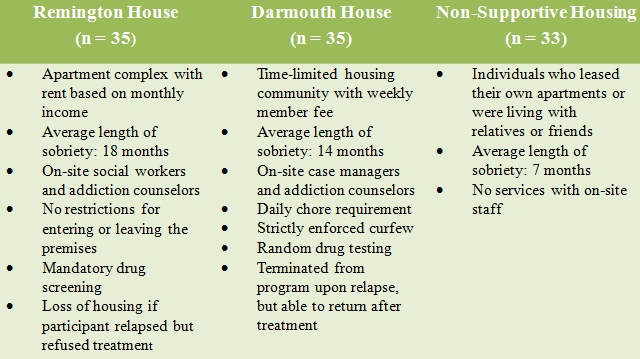Addressing Homelessness & Addiction Through Recovery Housing
Recovery residences for homeless people with substance use disorders is an emerging solution to a cyclical problem. Homeless individuals may have difficulty obtaining secure housing and in turn, lack of housing acts as a barrier to sobriety.
Read more on: Recovery ResidencesWith a focus on affordable units and social support, supportive housing creates an environment crucial for helping homeless individuals achieve sobriety and prevent relapse. Services offered by such facilities include job training, childcare services, case management, counseling, and crisis intervention.
Collard and colleagues studied the efficacy of recovery residences in terms of length of sobriety, levels of abstinence self-efficacy (the belief that one is capable of achieving an outcome) and rates of employment by comparing individuals who do and do not live in recovery residences (N= 103). Participants were required to be sober and have lived in the same housing for at least three months.
Below, the table describes the three housing situations in which participants resided:

The study population represents low-income adults in recovery in Atlanta, Georgia. Almost 90% were African American, three quarters were male, and over three quarters had an income at or below $12,000 per year. Over half had a history of using multiple substances (mostly cocaine and alcohol).
WHAT DID THIS STUDY FIND?
The duration of sobriety was significantly longer for both the supportive housing groups, when compared to the non-recovery residence group. Additionally, length of sobriety was positively correlated with duration of stay at each of the recovery residences.
There were significantly higher rates of employment at Darmouth House than the alternative housing situations. There were no significant differences between groups in terms of self-efficacy.
IN CONTEXT
With socioeconomic factors working against homeless individuals, it can be difficult to emerge from the cycle of homelessness and addiction.
Homeless people comprise an estimated 18% of the U.S. population, posing a significant social challenge. Recovery residences offer an opportunity to break the cycle and address both issues concurrently.
While this study is not representative of the general homeless population, in metropolitan areas similar to Atlanta, the availability of these facilities could positively impact the recovery process of such individuals.
There is a shortage of affordable housing (even without recovery support) in the U.S.; for every 100 low-income renter households, there are only 29 affordable units available.
In order to scale up this type of intervention, policy issues surrounding affordable housing and homelessness must be addressed at the national level before widespread benefits to the recovery process can be achieved.
This study highlights an important issue and introduces a resource that could be of critical benefit to homeless individuals with substance use disorder.
This study is a critical first step in evaluating the benefit of supportive housing, but longitudinal studies, and ideally experimental ones, are needed to observe change over time for participants living in recovery residences compared to standard housing.
- LIMITATIONS
-
- This study is not representative of the general homeless population.
- The correlational nature of the study does not offer firm conclusions about the benefits of recovery residences. For example, since the authors were unable to control for confounding variables such as recovery motivation in the analysis, it is impossible to tell if the association between abstinence and recovery residency is explained by another unmeasured variable.
BOTTOM LINE
- For individuals & families seeking recovery: It is important that homeless family and friends receive recovery specific supportive services that will aid in their recovery.
- For scientists: Replication of these findings through longitudinal methodology in other U.S. metropolitan areas would provide more evidence for the effectiveness of supportive housing facilities. A comparison of benefits of specific services offered in these facilities is needed to ensure maximum effectiveness of future supportive housing projects.
- For policy makers: Since the availability of affordable housing is a national issue, it will be difficult to incorporate supportive housing facilities on the large-scale until this problem is addressed.
- For treatment professionals and treatment systems: If you are treating a homeless patient, connect them to the social services that may help rectify the psychosocial factors that are negatively impacting their health and interfering with efforts to sustain recovery.
CITATIONS
Collard, C. S., Lewinson, T., & Watkins, K. (2014). Supportive housing: an evidence-based intervention for reducing relapse among low income adults in addiction recovery. Journal of evidence-based social work, 11(5), 468-479.

